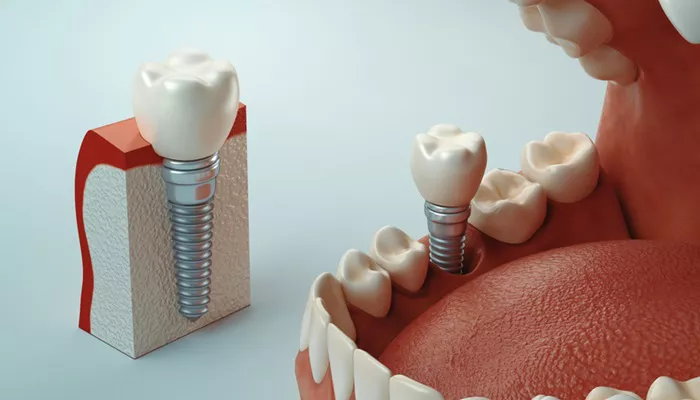Dental implants have emerged as a reliable and effective method for replacing missing teeth, offering patients a durable and aesthetically pleasing restoration. However, a common question among individuals considering implants is whether it is safe to place them on the same day as tooth extraction. This article aims to provide a comprehensive and science-based answer to this question, addressing the safety, feasibility, process, benefits, risks, and aftercare associated with immediate dental implants.
Overview of Dental Implants
Dental implants are artificial tooth roots made of titanium or titanium alloy, which are surgically placed into the jawbone to support a replacement tooth or bridge. They are designed to mimic the structure and function of natural teeth, providing a stable foundation for a dental prosthesis. The success of dental implants depends on several factors, including the quality and quantity of bone available for implant placement, the health of the surrounding gum tissue, and the overall oral health of the patient.
Immediate Dental Implants: What Are They?
Immediate dental implants, also known as same-day implants, are placed into the jawbone on the same day as tooth extraction. This procedure aims to minimize the number of surgical procedures required, reduce healing time, and provide patients with a faster return to normal oral function. Immediate implants are particularly suitable for patients with healthy jawbones and gums, as well as those who have had a single tooth extracted.
Safety Considerations
The safety of immediate dental implants depends on several factors, including the patient’s overall health, the location and number of teeth being extracted, and the experience of the dental surgeon. Here are some key considerations to ensure the safety of immediate implants:
Patient Selection: Ideal candidates for immediate implants are those with healthy jawbones and gums, good oral hygiene habits, and no underlying medical conditions that could compromise healing. Patients with inadequate bone density or those who have undergone extensive periodontal surgery may not be suitable for immediate implants.
Surgical Technique: The placement of immediate implants requires a high level of precision and skill. The dental surgeon must carefully assess the bone density, gum tissue health, and the position of adjacent teeth to ensure proper implant placement. Improper placement can lead to implant failure, infection, or damage to adjacent teeth and structures.
Postoperative Care: Proper postoperative care is crucial for the success of immediate implants. Patients must follow the dentist’s instructions for oral hygiene, diet, and medication use. Regular follow-up appointments are also necessary to monitor the healing process and address any complications that may arise.
Benefits of Immediate Dental Implants
Despite the potential challenges associated with immediate implants, they offer several benefits that make them an attractive option for many patients:
Minimized Surgical Trauma: By placing implants on the same day as extraction, patients can avoid additional surgical procedures and reduce the overall trauma to the oral tissues.
Reduced Healing Time: Immediate implants can lead to faster healing and a shorter recovery period compared to traditional implant placement, which typically requires a healing period of several months before the placement of the final restoration.
Cost-Effective: By reducing the number of surgical procedures required, immediate implants can be more cost-effective in the long run.
Improved Aesthetics: Immediate implants can provide patients with a more immediate improvement in their smile and overall facial aesthetics.
Risks and Complications
While immediate dental implants offer several benefits, they also come with certain risks and complications. These include:
Implant Failure: Improper placement or insufficient bone density can lead to implant failure, requiring removal and possible re-implantation at a later date.
Infection: Postoperative infections are a common complication of any surgical procedure, including immediate implants. Proper oral hygiene and antibiotic use can help reduce the risk of infection.
Damage to Adjacent Teeth and Structures: Improper placement or excessive force during surgery can damage adjacent teeth, nerves, or other oral structures.
Increased Sensitivity: Patients may experience increased sensitivity or discomfort in the area around the implant during the healing process.
Aftercare and Follow-Up
Proper aftercare and follow-up are essential for the success of immediate dental implants. Patients should follow these guidelines to ensure optimal healing and long-term implant success:
Oral Hygiene: Maintain good oral hygiene practices, including brushing and flossing regularly, and using an antiseptic mouthwash as recommended by the dentist.
Diet: Avoid hard, sticky, and crunchy foods that could damage the implant or surrounding tissues. Stick to soft, nutritious foods during the healing period.
Medication Use: Follow the dentist’s instructions for taking pain medication, antibiotics, and other prescribed medications.
Regular Follow-Up Appointments: Attend regular follow-up appointments to monitor the healing process, address any complications, and ensure proper implant integration into the jawbone.
Conclusion
In conclusion, immediate dental implants can be a safe and effective option for replacing missing teeth on the same day as extraction. However, the success of this procedure depends on careful patient selection, precise surgical technique, and proper postoperative care. Patients considering immediate implants should consult with a qualified dental surgeon to assess their suitability for this procedure and understand the potential risks and benefits. With proper care and follow-up, immediate implants can provide patients with a durable, functional, and aesthetically pleasing restoration that improves their oral health and overall quality of life.
Related topics:

